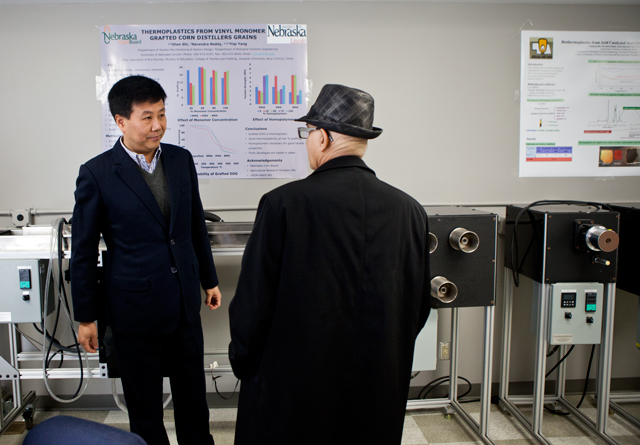UNL professor Yiqi Yang’s research leads to discovery of eco-friendly polylactide plastic – UNL Yiqi Yang eco friendly polylactide plastic - Arhive
UNL Yiqi Yang eco friendly polylactide plastic UNL Yiqi Yang eco friendly polylactide plastic UNL Yiqi Yang eco friendly polylactide plastic UNL Yiqi Yang eco friendly polylactide plastic UNL Yiqi Yang eco friendly polylactide plastic UNL Yiqi Yang eco friendly polylactide plastic
UNL professor Yiqi Yang’s research leads to discovery of eco-friendly polylactide plastic
The University of Nebraska-Lincoln’s Charles Bessey professor Yiqi Yang and his colleagues discovered a plant-based alternative for petroleum-based plastics in the textile and materials industries.
“My whole career here at UNL is on green, bio-based products for the textile and materials industry,” Yang said.
Yang began working on a green alternative for plastic in the 1990s and began collaborating with Helan Xu, Gangwei Pan, Bomou Ma and Jing Yang from the Jiangnan University in China in the early 2000s.
Bingnan Mu, a graduate student in human sciences, specializing in textile science, joined the project a year ago. He became interested in the project because of the possibility of this green process working at an industrial scale.
“I am excited for finding the relationship between molecular structures and mechanical properties of polylactide,” Mu said. “It is [so] enjoyable to explain behaviors of polymers using characterizations of molecular structures.”
The plastic Yang and his team researched has a biodegradable component that comes from a polylactic acid or polylactide, found in cornstarch and other plants — a more environmentally friendly alternative to petroleum-based plastics.
“[The] whole industry hopes that we have some fibers that are sustainable from a renewable resource with less environment impact to reduce impact of petroleum,” Yang said.
Besides the polylactide plastic being more green, Yang and his team found they could sustainably manufacture this plastic on a small-scale level, and it is very likely to be just as sustainable and environmentally friendly on a large-scale level. The polylactide-based plastic is also cheaper to produce than the petroleum-based plastics.
The technology for large-scale production of the polylactide plastic is ready, Yang said, so it’s only a matter of funding from an outside source.
“We have to educate our students, not to make money from [the research],” he said. “We use knowledge we gain so hopefully [students] will be an entrepreneur[s].”

